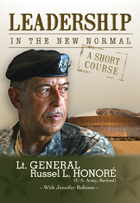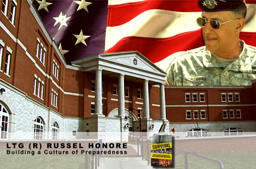Resources:
General Honoré is a member of the Expert Council at Firestorm Solutions, LLC. The Expert Council is an advisory group comprised of specialists from various disciplines, professions and industries.
General Honoré reached out to Muscle Wall® because he saw that Muscle Wall® is producing effective tools and solutions that can help communities, businesses, and homeowners become more prepared.
The following is an excerpt from General Honoré's first book, Survival: How a Culture of Preparedness Can Save America and You from Disasters.
Online Disaster Map
Emergency Kits
The Ideal Situation
Emergency Supplies can be simple or complex. It is recommended that you begin with the simple and work your way up as you learn more about what you would need and how to reduce the effects of disasters on you and your family. Ideally, each houshold should prepare and keep updated the following emergency supplies and kits:
HOME
Emergency supplies that are stored in a safe, health-conscious place.
- for when the emergency or disaster requires you to stay inside (shelter in place).
- one for each member of your household; or
- several for each kind of need you may have; or
- one on each floor of the home and in the garage for easy access.
WORK
An emergency supplies bag or box, primarily for your personal use.
- useful for both evacuation and shelter in place situations.
CAR
Emergency supplies that deal with each of your cars.
- items that you may need to get your car going, to provide emergency lighting, or to communicate with people when you need help.
Specialized disaster evacuation items.
- when a catastrophic disaster is about to occur and you have to evacuate the area for what might be a long period of time.
SCHOOL
An extra backback stored in your locker or dormitory room, or items stored in your main backpack that you carry around. It is a good idea to carry some items with you always (i.e., flashlight, whistle, bottled water, granola bars or other healthy snack food, surgical face mask, cell phone or text messaging device).
Generally, all of the above types of emergency supplies will have the same or similar items in them and they will be useful to you during almost all emergencies and disasters you will encounter. Having them stashed in several places will allow you greater flexibility in how you respond (go or stay) and how you sustain yourself when disaster strikes.
Important Tips
- Store your kits in a convenient place known to all family members.
- Keep a smaller version of the supplies kit in the trunk of your car, at work, and at school.
- Keep items in airtight plastic bags, if possible.
- Change your stored water supply every six months so it stays fresh. Drink what you have saved and replace it with fresh water.
- Replace your stored food every six months. Eat what you have saved and replace it.
- Rethink your kit and family needs at least once a year. Replace batteries, update clothes, etc.
- Ask your physician or pharmacist about storing prescription medications.
Links
Muscle Wall®
Muscle Wall® is a flood and containment solutions company that has engineered and built a system that is perfect for protecting assets from flood waters and storm water runoff. General Honoré reached out to Muscle Wall® because he saw that Muscle Wall® is producing effective tools and solutions that can help communities, businesses, and homeowners become more prepared.
We have provided the following links to articles and Websites that contain information crucial to the development of "A Culture of Preparedness."
The American Red Cross
Preparing and Getting Trained
FEMA
Get Disaster Information




